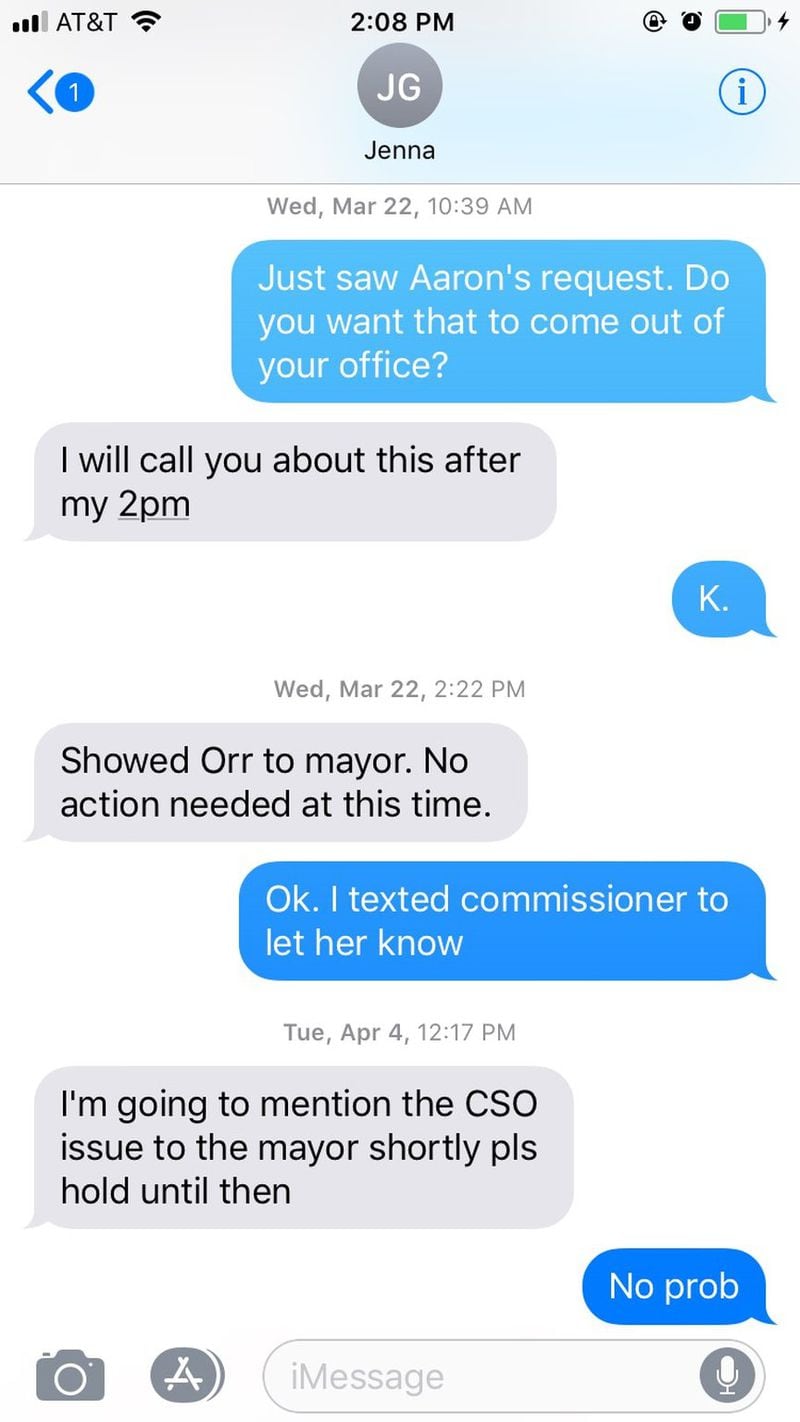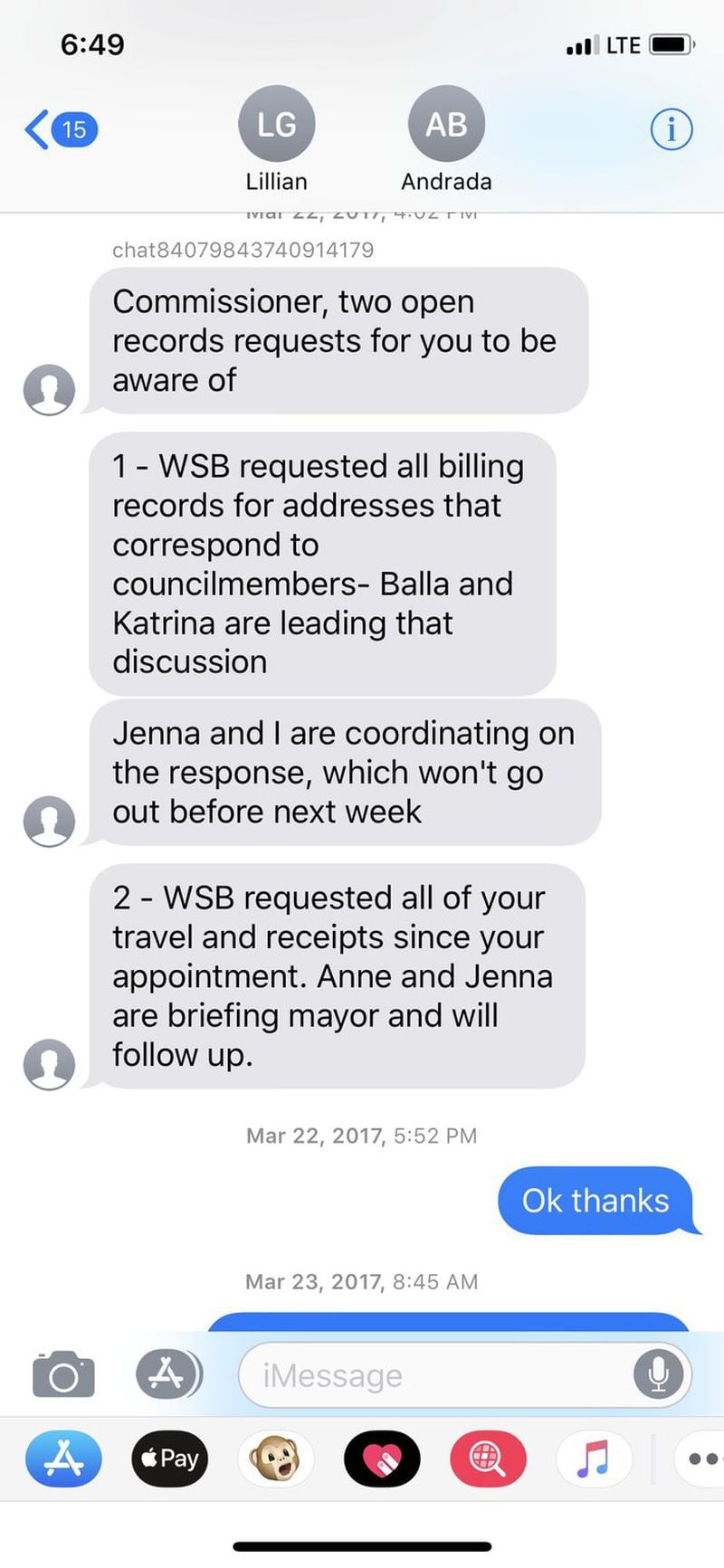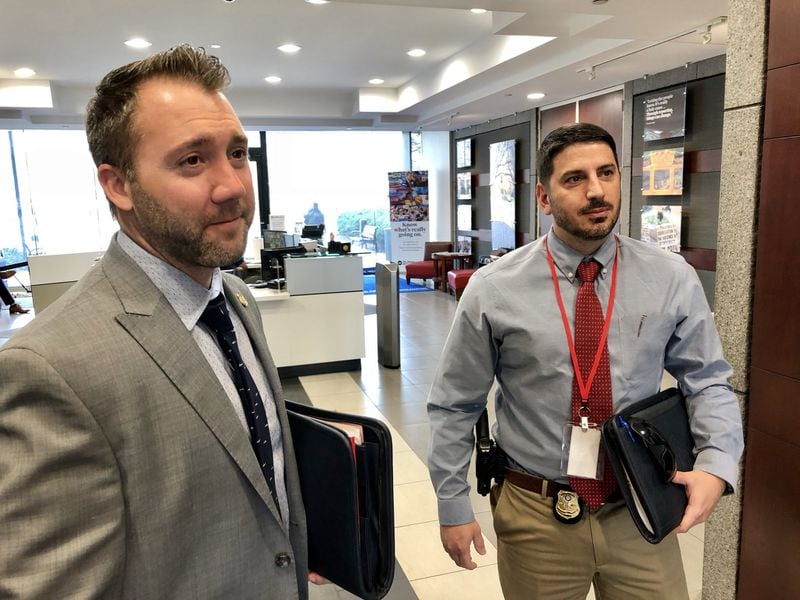The Atlanta Journal-Constitution and Channel 2 Action News have obtained text messages that raise fresh questions about former Atlanta Mayor Kasim Reed’s role in delaying public information requests under Georgia’s sunshine laws.
In the messages, dated March 22, 2017, Reed’s former press secretary Jenna Garland tells a Watershed Department employee how she should handle a Channel 2 request for the public travel records of Commissioner Kishia Powell.
“Showed Orr to mayor,” Garland texted the employee, abbreviating “open records request.”
“No action needed at this time.”
In an email, the watershed employee, Lillian Govus, who has since left city employment, told the AJC and Channel 2 that Garland’s meaning was clear: “The directive was not to respond to the open records request.” Govus also said Powell told her she should do what the mayor’s office wished.
“Kishia Powell was abundantly clear that I was to follow the directive of the mayor’s office in all matters regarding WSB’s open records requests,” Govus said, using Channel 2’s station call sign.
Channel 2 received no response to its request and the watershed department never provided Powell’s records, now more than 13 months later.
Georgia’s sunshine laws, written to ensure that governments remain accountable to citizens, require public agencies to respond to records requests within three days and provide records as soon as they are available. Frustrating requests is a misdemeanor and punishable for up to a year in jail.
Greg Lisby, a Georgia State University professor who teaches communication law, said the failure to provide Powell's travel records was a clear violation of state law.
“The best-case scenario for the mayor here is that the subordinate misinterpreted what the mayor said,” Lisby said. “Worst-case scenario is that the mayor directed foot-dragging.”
In answers to AJC questions, Powell said Govus “did not provide the email with the open records request to me or our open records request coordinator. That is why the request was not responded to in 13 months.”
Earlier exchanges between Garland and Govus about a Channel 2 request for the water billing records of city officials triggered the GBI's criminal investigation into open records act violations at City Hall.
In those exchanges, first reported by the AJC and Channel 2, Garland told Govus to "be as unhelpful as possible," "drag this out as long as possible," and "provide the information in most confusing format available."
On Friday, the GBI asked the AJC and Channel 2 to provide the text messages of Garland's boss, former communications director Anne Torres, after the media outlets reported that Torres pressured the Atlanta Beltline CEO to ignore the agency's attorney and delay the release of the CEO's employment contract.
“We can hold whatever we want for as long as we want,” Torres texted CEO Brian McGowan in September 2017. She also issued a veiled threat, telling McGowan he should talk to Reed about the attorney, Nina Hickson.
“She’s clearly going to be an issue for you going forward. I would talk to MKR about how to deal with her,” wrote Torres, using shorthand for Mayor Kasim Reed.
Beltline rebuffed Torres’ directives and provided the contract.
The GBI is also seeking records associated with an AJC request for three years of Reed’s public credit card statements, which the AJC received March 19. The city fulfilled the request seven weeks after it was made — and only after Reed had reimbursed the city for about $12,000 in personal charges that he’d identified after he left office.
In a statement, Reed slammed the AJC and Channel 2’s reporting of this story as “nothing more than an attempt to garner further headlines and attack the reputation of a fine public servant.”
“This allegation is a complete mischaracterization of the events which took place surrounding this Open Records Request,” Reed said. “Jenna Garland worked tirelessly to respond to open records requests and media inquiries in good faith each and every day. There are no circumstances under which the City would refuse to comply with a valid Open Records Request.”
Garland did not respond to messages seeking comment.
Clark D. Cunningham, a professor of law and ethics at Georgia State University, said the texts regarding the request for Powell's travel records warrant scrutiny by the GBI and the state Attorney General's office.
“Although the text messages by themselves could be given an innocent interpretation, when put into the context of text messages between Govus and the mayor’s office [about billing records] two weeks earlier, and in the context of text messages from the mayor’s office to the Beltline later that year, there is a possibility that the failure to comply here was done with criminal intent,” Cunningham said.
Powell blames Govus
In March, the AJC and Channel 2 filed a complaint with state Attorney General Chris Carr, alleging 10 examples of open record violations and a "culture of political interference" with open records requests at City Hall.
The texts between Garland and Govus about the request for Powell’s travel records offer the first suggestion that Reed himself fostered that culture.
“Just saw Aaron’s request,” Govus texted Garland just an hour after receiving Channel 2’s request. “Do you want that to come out of your office?”
Garland, who had been copied on Channel 2’s request, said she would call Govus that afternoon, according to the texts, and then followed up with her “no action” directive after showing the request to Reed.
Replied Govus: “Ok. I texted commissioner to let her know.”
Texts provided by Powell show she was informed about the request by Govus.
“Anne and Jenna are briefing mayor and will follow up,” Govus said, referring to Torres and Garland.
Powell replied: “Ok thanks.”
In a response to the AJC’s questions, Powell faulted Govus for the failure to process the request.
“I cannot speak to why it was not addressed appropriately by Ms. Govus,” Powell said. “Other than her notification to me of this ORR, I do not recall discussing this specific request.”
Powell also said that “it was Ms. Govus’ responsibility to manage this process according to the processes and policies in place. She did not follow the Department’s procedures or requirements and that was her choice.”
Govus said she was acting as instructed by Powell.
“As you can see from the messages, I was not empowered to comply with these laws, regardless of how I pushed back,” she said. “My actions — or lack thereof — were representative of my superiors’ orders with no regard to the ethical and legal ramifications of non-compliance.”
Cyberattack adds new delays
Channel 2's request for Powell's travel records came as reporters were scrutinizing Powell's connections to Mitzi Bickers, a former city director of human services, who emerged early last year as a subject of the federal bribery probe at City Hall and was indicted last month.
A lawsuit filed in February 2017 in Jackson, Miss., had alleged that Powell, a former public works director in Jackson, tried to steer a waterworks contract to a partnership that included Bickers. Powell has denied any wrongdoing.
About a week after Channel 2’s request for Powell’s travel records, the I-85 bridge collapsed, absorbing the attention of the city and media outlets across the country.
In his statement, Reed faulted Channel 2 for not following up with his office and questioned why the AJC and Channel 2 did not cite this open records request in the complaint about violations to the state AG.
State law puts the onus of following the law on the government agency, not the requester, and the AJC and Channel 2 only learned the context of the texts between Garland and Govus — and that the request remained outstanding — after additional reporting.
Last week, the AJC and Channel 2 renewed the request for Powell’s travel records.
In an email, Powell said, “We have no problem fulfilling the open records request,” and promised the records by last Thursday.
In a follow up message, a Watershed official said fulfillment will be delayed because of the March 22 cyberattack on city of Atlanta computer systems, and records will be made available on a “rolling basis.”
Statement from Jeff Dickerson on behalf of former Mayor Kasim Reed:
“This allegation is a complete mischaracterization of the events which took place surrounding this Open Records Request. Jenna Garland worked tirelessly to respond to open records requests and media inquiries in good faith each and every day. There are no circumstances under which the City would refuse to comply with a valid Open Records Request. The City was responding to numerous records requests from WSBTV and the AJC in the days surrounding this particular request and were speaking regularly about the status of all such requests. Had the City truly ignored this request as WSBTV now alleges some 15 months later, WSBTV would have taken measures to follow-up on the request or enforce the release of this public information. WSBTV did not do so. In fact, WSBTV filed a complaint with the Attorney General’s office over three (3) weeks ago alleging specific violations of the Georgia Open Records Act by the City, yet WSBTV never mentioned this allegation. This is nothing more than an attempt to garner further headlines and attack the reputation of a fine public servant.”
Being transparent with readers
Staff writer J. Scott Trubey is named in the AJC and Channel 2’s complaint to Attorney General Chris Carr detailing examples of the city’s failure to comply with the Georgia Open Records Act.
About the Author











